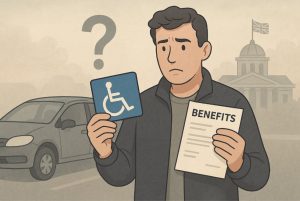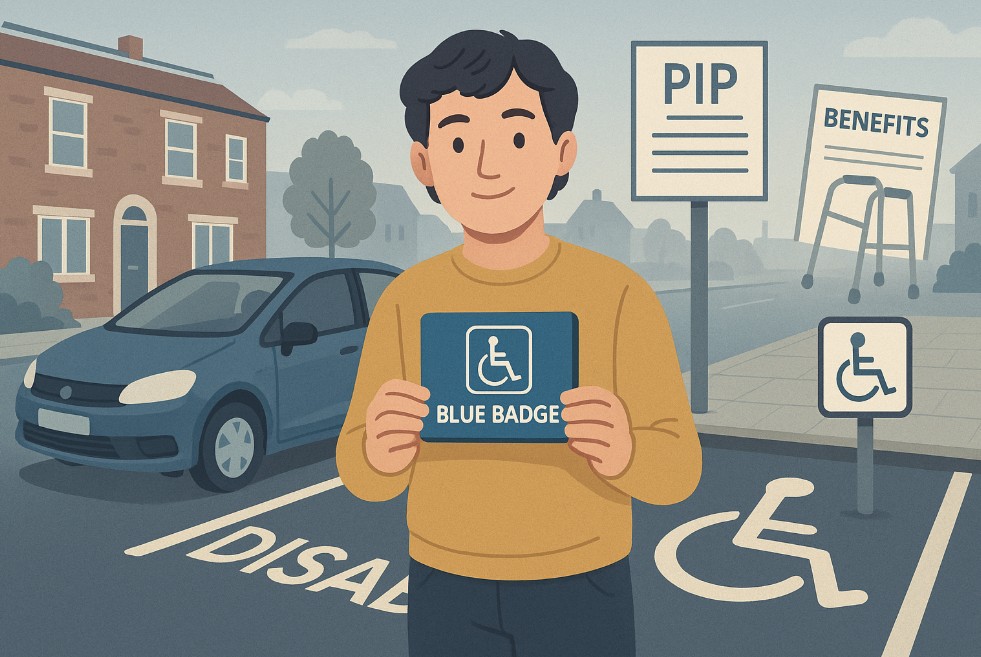Table of Contents
ToggleHow will the latest government reforms impact people receiving Personal Independence Payment (PIP) and linked support schemes such as the Blue Badge and free bus travel?
In light of growing public anxiety and months of speculation, the UK Government has provided important clarification. Despite upcoming welfare reforms planned for implementation in 2026, current PIP claimants can now feel more assured. The Department for Work and Pensions (DWP) has made it clear that no existing PIP recipient will lose their benefit or associated entitlements such as the Blue Badge or Carer’s Allowance as a result of these reforms.
This blog explores what has been confirmed, what remains under review, and what the future holds for new applicants. With the welfare system undergoing a significant policy overhaul, it is crucial for individuals and support networks to understand where they stand and how best to prepare.
What Has the Government Said About Changes to PIP and Blue Badge Entitlements?
In a statement delivered to Parliament on 30 June 2025, Secretary of State for Work and Pensions Liz Kendall confirmed that existing recipients of PIP and all related “passported benefits” would not be affected by the changes outlined in the Government’s proposed reforms.
These passported benefits include support such as the Blue Badge for parking concessions, free bus travel, Carer’s Allowance, and elements of Universal Credit.
Kendall’s address was intended to reassure the public and stem confusion about how the new rules would affect the 3.7 million people currently in receipt of PIP. She made clear that even if these claimants undergo reassessment, their current awards will remain protected.
The changes, including new eligibility thresholds, will only apply to new PIP applications made from November 2026 onwards.
When Will the New PIP Rules Come Into Effect?

The government has set November 2026 as the target date for implementing the new PIP eligibility framework. This decision follows intense scrutiny from MPs and campaigners, as well as concerns from disabled communities and organisations.
As a result, the Government agreed to delay the rollout and carry out a comprehensive review of the assessment criteria.
This review is being led by Sir Stephen Timms, working closely with disability charities and health professionals, and is expected to conclude by Autumn 2026. Until then, the current eligibility rules and assessment system for PIP will remain in place.
The phased approach aims to avoid disrupting the lives of current beneficiaries and to ensure any reform is carried out fairly, based on real-life needs and challenges.
What Are the Proposed Eligibility Changes for New Applicants?
From November 2026, new PIP claimants will face stricter eligibility criteria. Among the proposed changes is the introduction of a minimum threshold for the daily living component of PIP.
Under the new rules, applicants must score at least four points on a single daily living activity to qualify for support in that category.
This marks a shift from the current system where cumulative scores across multiple activities could qualify someone for payment. The revised criteria aim to simplify assessments and focus support on those with the most significant and long-term needs.
This change is particularly important for individuals with fluctuating or hidden disabilities, such as mental health conditions, who may find it harder to meet a single high-point threshold under the proposed system.
Will Existing PIP Claimants Lose Access to the Blue Badge?

No. The DWP has confirmed that existing claimants will not lose access to the Blue Badge scheme or other related services, even if they are reassessed before or after 2026.
The government’s position is that reassessments under current rules will not apply new criteria, ensuring continued access to essential mobility support.
The Blue Badge remains a vital service for those with limited mobility, allowing them to park closer to destinations and maintain independence. The link between PIP mobility awards and Blue Badge eligibility remains intact for all current recipients.
However, individuals whose PIP award ends or lapses before 2026 and who need to reapply may find themselves subject to more scrutiny, even under current rules. It is therefore advisable for claimants to keep documentation up to date and stay informed through local authority guidance.
How Will the Welfare System Support Claimants During the Transition?
To minimise disruption for those who may be affected by the future changes, the Government has committed to offering transitional support. A 13-week financial buffer will be introduced for claimants who lose eligibility due to the new PIP daily living rules after November 2026.
This buffer will serve as a protection period during which individuals will continue to receive financial support. It is designed to give claimants time to adapt to the change, explore other benefits, and access employment or health-related support.
Notably, this 13-week protection is more generous than previous transition periods, such as the move from Disability Living Allowance (DLA) to PIP, which provided only a 4-week cushion.
The Universal Credit and Personal Independence Payment Bill includes provisions to implement this change and also introduce more personalised employment support packages.
Who Will Be Permanently Protected Under the Reforms?

The reforms also include strong protections for those with the most severe and lifelong conditions. Around 200,000 individuals who meet the Severe Conditions Criteria (SCC) will be exempt from reassessment for Universal Credit.
These individuals will also receive an enhanced health top-up of £97 per week under Universal Credit.
To qualify for this exemption, individuals must meet the following criteria:
| Severe Conditions Criteria (SCC) | Requirement |
| Lifelong and permanent diagnosis | Must be confirmed by an NHS-qualified healthcare professional |
| No realistic chance of recovery | Ongoing support will be needed indefinitely |
| Consistent functional limitations | Expected to meet Limited Capability for Work and Work-Related Activity (LCWRA) rules permanently |
| NHS-diagnosed | Diagnosis must have occurred in an NHS setting |
This protection ensures peace of mind and financial stability for those who are most in need and who may never be able to return to work.
Why Are These Reforms Being Introduced?
The Government has presented a compelling fiscal and social case for reform. Officials argue that the current welfare system is financially unsustainable and does not effectively support those who could return to work.
According to government data, since the COVID-19 pandemic:
- Monthly PIP awards have increased from 13,000 to over 34,000
- Awards for anxiety and depression have tripled from 2,500 to 8,200 per month
- Over 1 million young people are not in employment, education, or training
- 1 in 10 working-age adults now claim sickness or disability-related benefits
Projected welfare spending on disability and incapacity support is expected to reach £70 billion annually by the end of this Parliament. In response, the Government is implementing measures to:
- Rebalance Universal Credit rates by adjusting the health element for new claims from April 2026
- Increase the main rate of Universal Credit to rise above inflation for four consecutive years
- Introduce a £1 billion employment support package to help people with disabilities or long-term health conditions re-enter the workforce
What Other Measures Are Being Introduced to Support Claimants?

In addition to the protections and reforms outlined, the government is taking further steps to modernise support systems. A key initiative is the “Right to Try Guarantee”, which allows claimants to attempt work without triggering an immediate reassessment or loss of benefit.
This addresses long-standing concerns from benefit recipients who feared penalisation for attempting to return to work, even on a trial basis.
The government also plans to expand “Pathways to Work”, with over 1,000 dedicated advisors deployed nationwide. These advisors will support people with:
- Job preparation and CV development
- Tailored skills training and access to apprenticeships
- Navigating the benefits system during work transitions
The aim is to empower more people into sustainable employment without fear of losing essential financial support too quickly.
How Should Current PIP or Blue Badge Holders Prepare?
Current recipients are not required to take any action immediately, as their benefits remain secure under existing legislation. However, it is still wise to:
- Review your PIP award regularly to ensure all medical documentation is current
- Prepare for any scheduled reassessments by collecting updated evidence
- Check renewal dates for Blue Badge applications and apply early if needed
- Stay informed about government announcements, particularly as 2026 approaches
Support is available through welfare advisors, local councils, and disability rights organisations. These include Citizens Advice, Disability Rights UK, and Scope.
FAQs About the PIP Blue Badge Welfare Changes
Will existing PIP claimants lose access to the Blue Badge or bus pass?
No. All current PIP claimants will retain their Blue Badge and free bus travel entitlements, even if reassessed before 2026.
When do the new rules start?
New eligibility criteria will only apply to PIP claims made on or after November 2026.
What happens if I lose PIP after 2026?
If your claim ends due to new criteria, you’ll receive a 13-week transitional support period and tailored employment support.
Will Carer’s Allowance or Universal Credit be affected?
No, existing passported benefits such as Carer’s Allowance will remain protected for current recipients.
Can I still get a Blue Badge without PIP?
Yes, you can apply directly through your local council, but you’ll need to provide detailed medical and mobility evidence.
How will people with lifelong conditions be protected?
Those meeting the Severe Conditions Criteria will be exempt from future reassessments and eligible for enhanced Universal Credit support.
What is the Right to Try Guarantee?
It ensures that individuals testing employment opportunities will not face automatic benefit reviews or sanctions.
READ NEXT:




